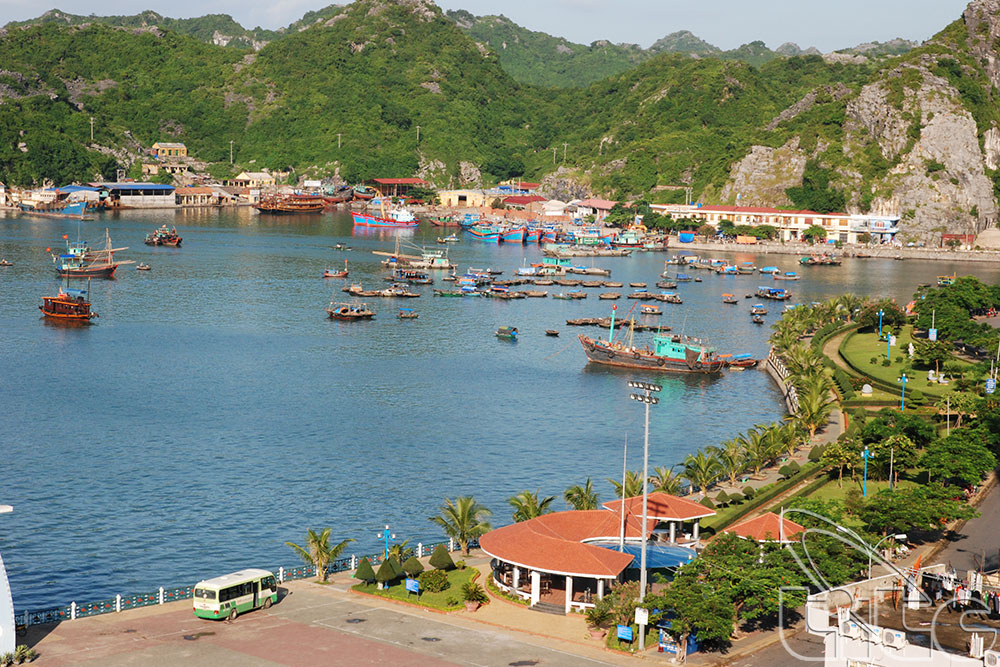Proud of owning the biggest and most modern seaport in the North; however, for years Hai Phong has always concerned about seeking the solutions to control and limit the pollution of marine environment.

Cat Ba Island (Source: vietnamtourism.com)
The enormous increase in pollution
Never before has the environment in estuarine and coastal area of Hai Phong been such polluted. According to the results of environmental monitoring carried out by the Department of Natural Resources & Environment 2015, the level of water pollution in coastal water is rising compared to 2014. Most of the pollutants found exceed the permitted level.
The waste source in Hai Phong coastal area accounts for 60-70% of the total sources discarded from the continent into the sea. In particular, Thai Binh River system flowing into the sea through the Cam and Bach Dang estuaries contributes about 53-63% of organic subtance, nitrogen and phosphorus account for approximately 27% - 48%. Besides, there are many industrial zones such as Dinh Vu, An Duong, Do Son near the coastal area...
Industrial waste sources are huge here, especially in Dinh Vu Industrial Zone, adjacent to Cam estuary. In these areas, the concentration of oil and cyanide in the soil absorbed into rivers and the sea is quite high. In addition, aquaculture activities, the houseboats and inhabitants of fishing village population in these waters also emit large amounts of leftovers, sewage, garbage....
According to the Department of Natural Resources and Environment of Hai Phong City, pollution in the coastal areas and estuaries is mainly due to the source of waste water and solid waste discarded from the land to the estuary; oil spill due to maritime activities and seaports; exploitation of sea mineral and reclamation; aquaculture extraction, processing and logistics; dredging; tourism activities and services on the islands and along the island; etc.
To solve this problem, over the years, the city has implemented several measures and plans to check and control polluting sources of marine environment. Particularly in 2015, the city has inspected environmental protection work as planned at 106 units, including 35 units relating to the field of water resources; 12 units under the risk of oil spill and pollution of the marine environment and islands; inspected seafood exploitation in Bach Long Vy water.
However, these measures have not controlled and curbed the pollution of the marine environment. Meanwhile, technical infrastructure to control pollution and protect the environment of the city is degraded without investment. The city has no centralized sewage treatment plants. Consequently, a large amount of wastewater and untreated waste flow directly into the sea.
Integrated Management
Sharing the difficulties of Hai Phong, the Institute of Marine Environment and Natural Resources (Viet Nam Academy of Science and Technology) has released the mathematical delft-3d model to predict the dispersion direction of the hazardous waste on Hai Phong waters.
Based on this model, the scientists can determine the dispersal rule of hazardous waste. For example in the rainy season, at low tide, the content of total suspended solids (TSS) of the rivers is over 100mg/l. The emission of biochemical oxygen demand (BOD) from the mainland to the coastal estuary at low tide is evident. Similarly with other hazardous substances such as ammonium salt, nitrate salt and phosphorus salt cling on to the area around Cat Ba Island or estuaries and coastal areas thanks to the seasonal ingoing and outgoing tide... These agents above cause pollution in a variety of lagoon and aquaculture areas.
On basis of calculations, the survey on dispersion direction of pollutants, the researchers of Institute of Natural Resources and Environment suggested Hai Phong to implement investment solutions to build wastewater treatment plants in the coastal areas in order to gradually curb the spread of hazardous chemicals; restrict the development of coastal industrial zones; strengthen inspection and control of pollution sources; monitor and keep track of the changes in environmental quality in the coastal and estuarine of Hai Phong to limit environmental incidents.
Seeking long-term solution, in 2016, Hai Phong City will cooperate with Brest City (France) to build the overall project on integrated management of coastal cities by 2020 and orientations to 2030. The project consists of the following tasks: building Integrated Information Management System (IIMS) and Geographic Information System (GIS); partioning coastal function towards exploitation, rational use of natural resources and coastal space; minimizing conflicts of interest between economic sectors; protecting, maintaining and restoring coastal ecosystems; building and implementing integrated monitoring program of natural resources and environment of sea and islands; developing and implementing community-based co-management models of natural resources and environmental protection in the coastal areas; etc.
Once this project is completed and put into operation, it will surely help Hai Phong better sync and implement activities to protect the environment in coastal waters.